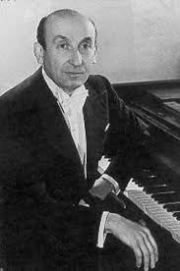Mischa Spoliansky
Mischa Spoliansky (28 December 1898 – 28 June 1985) was a Russian-born composer who lived for many years in Britain.
Spoliansky was born into a musical family in Biaystok, then part of the Belostok Oblast of the Russian Empire. His father was an opera singer and his sister would later become a pianist and his brother a cellist. After the birth of Mischa the family moved to Warsaw, and later Kalisz. After the early death of his mother, the family moved to Vienna.
Spoliansky's early musical education in piano, violin and cello was continued in Dresden under Prof. Mark Guensberg. At the age of ten Spoliansky made his public debut.
Shortly thereafter his father died and Spoliansky moved to Königsberg (Prussia) where he had relatives. In 1914 however as a result of the war he had to flee to Berlin, where his brother worked as a cellist.
Spoliansky worked in a coffeehouse as a pianist in order to continue his musical education at the Stern'sches Konservatorium. Spoliansky's first compositions were played by the UFA-Filmtheaterorchester in Friedrichstraße. In addition he worked as a composer and pianist in a Russian émigré cabaret. There Victor Hollaender and Werner Richard Heymann heard him and invited him to write and play for the literary cabaret "Schall und Rauch" in the basement of the Große Schauspielhaus, which Max Reinhardt had founded in 1919. Spoliansky set the texts of Kurt Tucholsky, Klabund, Joachim Ringelnatz, and accompanied stars such as Gussy Holl, Paul O'Montis, Rosa Valetti and Trude Hesterberg. In 1920 under the pseudonym "Arno Billing" he composed the melody for the first homosexual anthem called Das lila Lied, which he dedicated to Magnus Hirschfeld. It was published with other texts such as Sei meine Frau für vierundzwanzig Stunden.
In 1922 he met the poet Marcellus Schiffer and the Diseuse Margo Lion. He married the dancer Elsbeth (Eddy) Reinwald in the same year. In 1925 Spoliansky accompanied Richard Tauber to the playing of the LP of Schubert's "Winterreise". In his Revue Es liegt in der Luft (text by Marcellus Schiffer) in 1928 Marlene Dietrich performed. One year later she would be "discovered" in Spoliansky's "Zwei Krawatten" (Text by Georg Kaiser) by Josef von Sternberg, who was searching for the leading actress for Der Blaue Engel/The Blue Angel.
There followed in 1930 "Wie werde ich reich und glücklich?", in 1931 "Alles Schwindel", in 1932 "Rufen Sie Herrn Plim" and "Das Haus dazwischen", and in 1933 "100 Meter Glück".
In 1933 Spoliansky emigrated to London, where he began a second career as a film composer. His naturalization as a British national succeeded in large part thanks to Schlagers "Heute Nacht Oder Nie" from the film Das Lied einer Nacht (1932), which made Spoliansky world renowned.
Spoliansky wrote the song "Love Is Lyrical (Whisper Sweet Little Nothing to Me)", performed by Marlene Dietrich in the film Stage Fright.
However, among his very best songs were the four that he wrote for Paul Robeson, featured in the British films Sanders of the River in 1935 (The Canoe Song, Love Song, Congo Lullabye and The Killing Song) and King Solomon's Mines in 1937 (Ho,Ho and Climbing Up!). Another of his songs was performed by Elisabeth Welch in 1937 (Red Hot Annabelle).














 My Wish List
My Wish List










